Emotional Resilience in Entrepreneurship: Standing Out During Crisis
VerifiedAdded on 2023/04/21
|8
|2303
|409
Essay
AI Summary
This essay examines the critical role of emotional resilience in entrepreneurship, particularly during times of crisis. It discusses how entrepreneurs, especially those leading large companies, cultivate and utilize emotional resilience to effectively manage challenges and maintain stability. The essay highlights that emotional resilience is not merely an inherent trait but also a developed skill, essential for coping with unpredictable business environments. It emphasizes the importance of optimism, ethical conduct, strong social support, cognitive flexibility, and a clear sense of purpose in building resilience. The analysis draws upon various studies and examples to illustrate how resilient entrepreneurs can transform setbacks into opportunities, improve team morale, and ultimately achieve long-term success. The essay concludes that in today's dynamic and competitive business landscape, emotional resilience is a key differentiator that enables entrepreneurs to not only survive but also thrive amidst adversity.
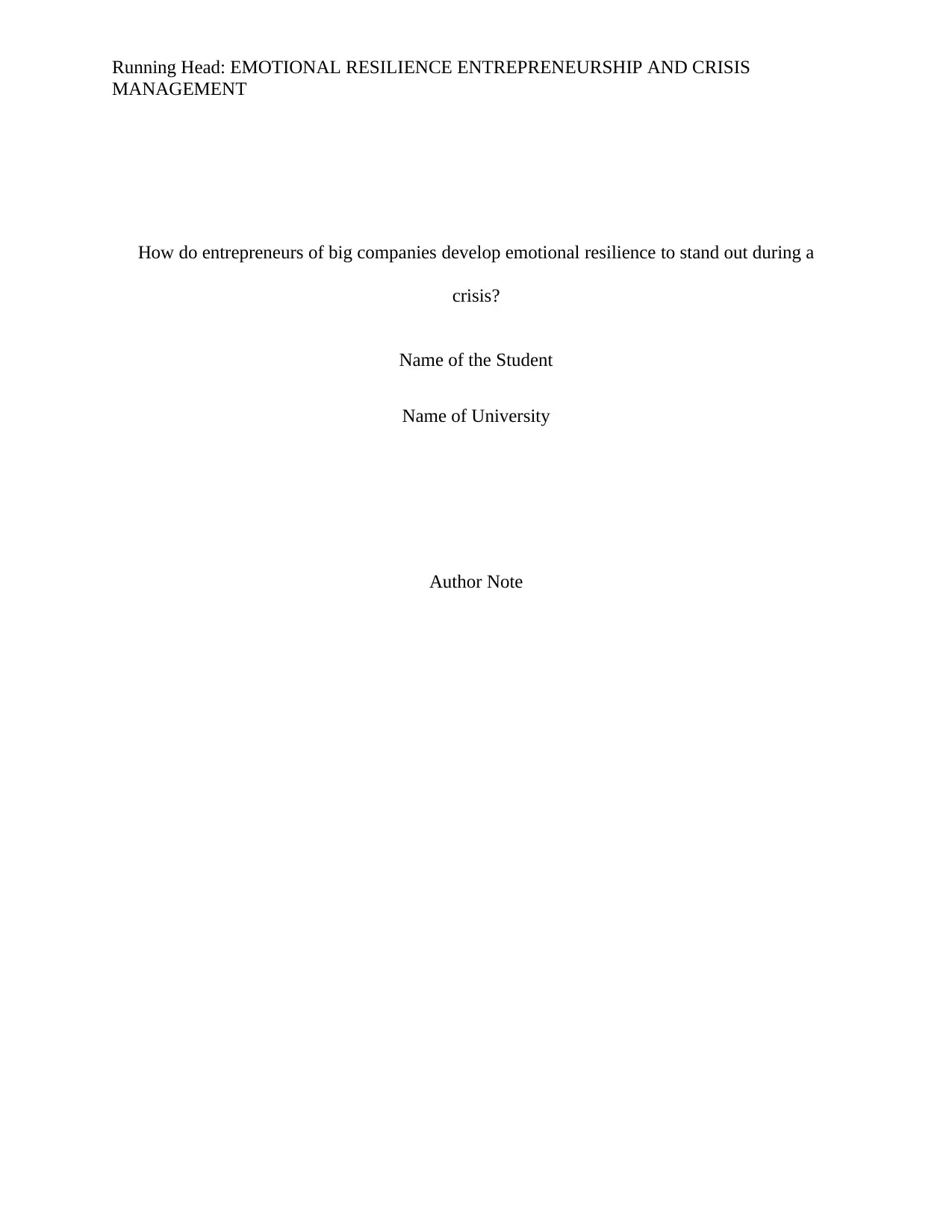
Running Head: EMOTIONAL RESILIENCE ENTREPRENEURSHIP AND CRISIS
MANAGEMENT
How do entrepreneurs of big companies develop emotional resilience to stand out during a
crisis?
Name of the Student
Name of University
Author Note
MANAGEMENT
How do entrepreneurs of big companies develop emotional resilience to stand out during a
crisis?
Name of the Student
Name of University
Author Note
Paraphrase This Document
Need a fresh take? Get an instant paraphrase of this document with our AI Paraphraser
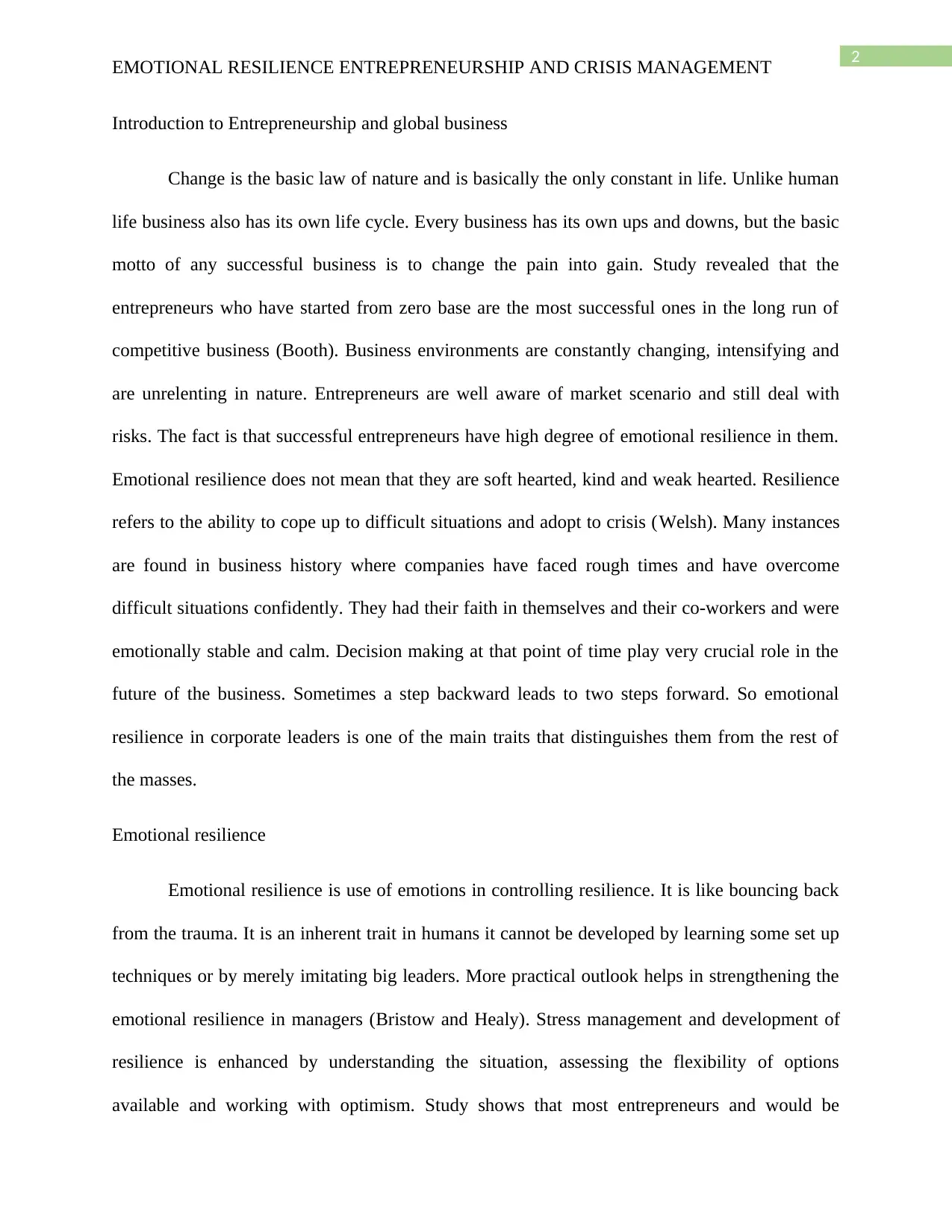
2
EMOTIONAL RESILIENCE ENTREPRENEURSHIP AND CRISIS MANAGEMENT
Introduction to Entrepreneurship and global business
Change is the basic law of nature and is basically the only constant in life. Unlike human
life business also has its own life cycle. Every business has its own ups and downs, but the basic
motto of any successful business is to change the pain into gain. Study revealed that the
entrepreneurs who have started from zero base are the most successful ones in the long run of
competitive business (Booth). Business environments are constantly changing, intensifying and
are unrelenting in nature. Entrepreneurs are well aware of market scenario and still deal with
risks. The fact is that successful entrepreneurs have high degree of emotional resilience in them.
Emotional resilience does not mean that they are soft hearted, kind and weak hearted. Resilience
refers to the ability to cope up to difficult situations and adopt to crisis (Welsh). Many instances
are found in business history where companies have faced rough times and have overcome
difficult situations confidently. They had their faith in themselves and their co-workers and were
emotionally stable and calm. Decision making at that point of time play very crucial role in the
future of the business. Sometimes a step backward leads to two steps forward. So emotional
resilience in corporate leaders is one of the main traits that distinguishes them from the rest of
the masses.
Emotional resilience
Emotional resilience is use of emotions in controlling resilience. It is like bouncing back
from the trauma. It is an inherent trait in humans it cannot be developed by learning some set up
techniques or by merely imitating big leaders. More practical outlook helps in strengthening the
emotional resilience in managers (Bristow and Healy). Stress management and development of
resilience is enhanced by understanding the situation, assessing the flexibility of options
available and working with optimism. Study shows that most entrepreneurs and would be
EMOTIONAL RESILIENCE ENTREPRENEURSHIP AND CRISIS MANAGEMENT
Introduction to Entrepreneurship and global business
Change is the basic law of nature and is basically the only constant in life. Unlike human
life business also has its own life cycle. Every business has its own ups and downs, but the basic
motto of any successful business is to change the pain into gain. Study revealed that the
entrepreneurs who have started from zero base are the most successful ones in the long run of
competitive business (Booth). Business environments are constantly changing, intensifying and
are unrelenting in nature. Entrepreneurs are well aware of market scenario and still deal with
risks. The fact is that successful entrepreneurs have high degree of emotional resilience in them.
Emotional resilience does not mean that they are soft hearted, kind and weak hearted. Resilience
refers to the ability to cope up to difficult situations and adopt to crisis (Welsh). Many instances
are found in business history where companies have faced rough times and have overcome
difficult situations confidently. They had their faith in themselves and their co-workers and were
emotionally stable and calm. Decision making at that point of time play very crucial role in the
future of the business. Sometimes a step backward leads to two steps forward. So emotional
resilience in corporate leaders is one of the main traits that distinguishes them from the rest of
the masses.
Emotional resilience
Emotional resilience is use of emotions in controlling resilience. It is like bouncing back
from the trauma. It is an inherent trait in humans it cannot be developed by learning some set up
techniques or by merely imitating big leaders. More practical outlook helps in strengthening the
emotional resilience in managers (Bristow and Healy). Stress management and development of
resilience is enhanced by understanding the situation, assessing the flexibility of options
available and working with optimism. Study shows that most entrepreneurs and would be
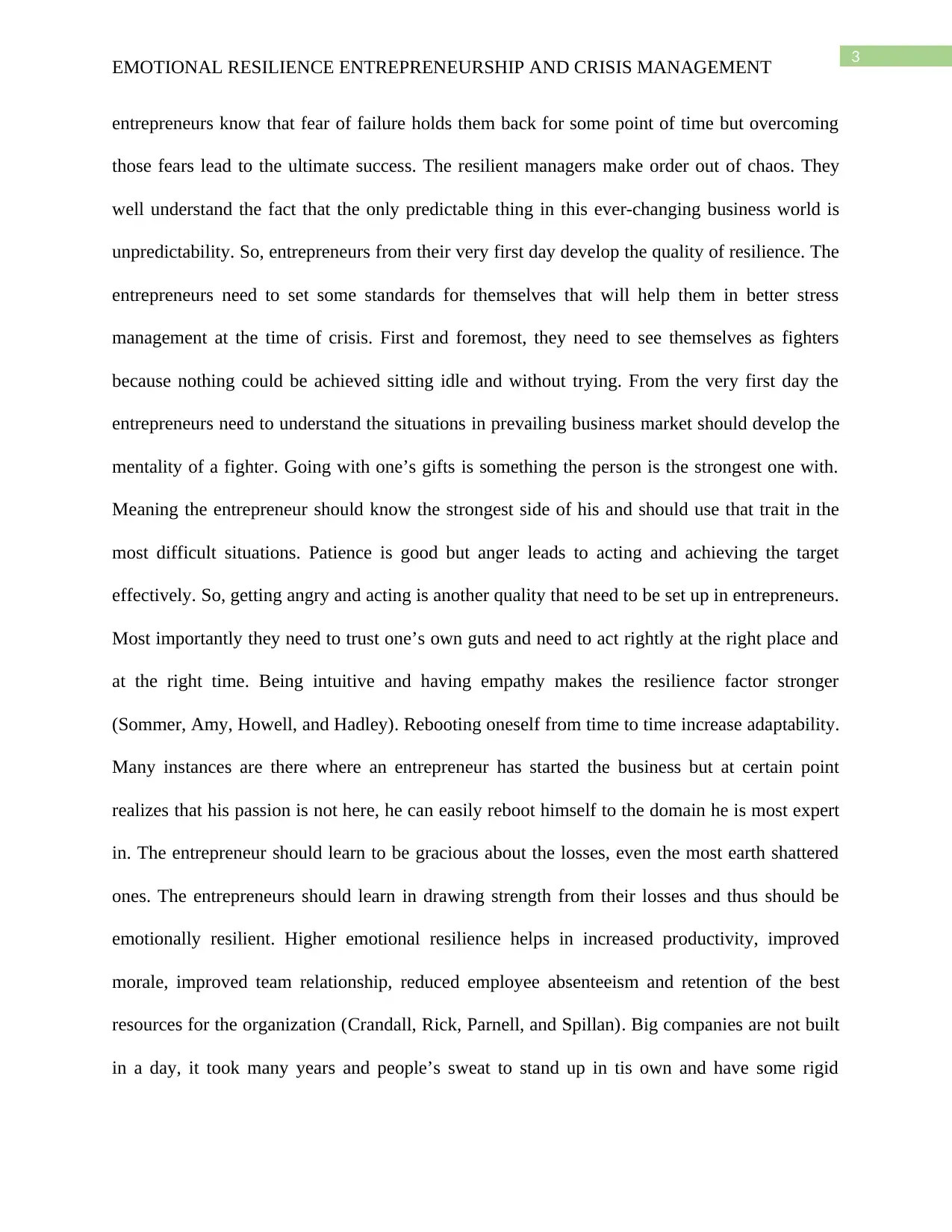
3
EMOTIONAL RESILIENCE ENTREPRENEURSHIP AND CRISIS MANAGEMENT
entrepreneurs know that fear of failure holds them back for some point of time but overcoming
those fears lead to the ultimate success. The resilient managers make order out of chaos. They
well understand the fact that the only predictable thing in this ever-changing business world is
unpredictability. So, entrepreneurs from their very first day develop the quality of resilience. The
entrepreneurs need to set some standards for themselves that will help them in better stress
management at the time of crisis. First and foremost, they need to see themselves as fighters
because nothing could be achieved sitting idle and without trying. From the very first day the
entrepreneurs need to understand the situations in prevailing business market should develop the
mentality of a fighter. Going with one’s gifts is something the person is the strongest one with.
Meaning the entrepreneur should know the strongest side of his and should use that trait in the
most difficult situations. Patience is good but anger leads to acting and achieving the target
effectively. So, getting angry and acting is another quality that need to be set up in entrepreneurs.
Most importantly they need to trust one’s own guts and need to act rightly at the right place and
at the right time. Being intuitive and having empathy makes the resilience factor stronger
(Sommer, Amy, Howell, and Hadley). Rebooting oneself from time to time increase adaptability.
Many instances are there where an entrepreneur has started the business but at certain point
realizes that his passion is not here, he can easily reboot himself to the domain he is most expert
in. The entrepreneur should learn to be gracious about the losses, even the most earth shattered
ones. The entrepreneurs should learn in drawing strength from their losses and thus should be
emotionally resilient. Higher emotional resilience helps in increased productivity, improved
morale, improved team relationship, reduced employee absenteeism and retention of the best
resources for the organization (Crandall, Rick, Parnell, and Spillan). Big companies are not built
in a day, it took many years and people’s sweat to stand up in tis own and have some rigid
EMOTIONAL RESILIENCE ENTREPRENEURSHIP AND CRISIS MANAGEMENT
entrepreneurs know that fear of failure holds them back for some point of time but overcoming
those fears lead to the ultimate success. The resilient managers make order out of chaos. They
well understand the fact that the only predictable thing in this ever-changing business world is
unpredictability. So, entrepreneurs from their very first day develop the quality of resilience. The
entrepreneurs need to set some standards for themselves that will help them in better stress
management at the time of crisis. First and foremost, they need to see themselves as fighters
because nothing could be achieved sitting idle and without trying. From the very first day the
entrepreneurs need to understand the situations in prevailing business market should develop the
mentality of a fighter. Going with one’s gifts is something the person is the strongest one with.
Meaning the entrepreneur should know the strongest side of his and should use that trait in the
most difficult situations. Patience is good but anger leads to acting and achieving the target
effectively. So, getting angry and acting is another quality that need to be set up in entrepreneurs.
Most importantly they need to trust one’s own guts and need to act rightly at the right place and
at the right time. Being intuitive and having empathy makes the resilience factor stronger
(Sommer, Amy, Howell, and Hadley). Rebooting oneself from time to time increase adaptability.
Many instances are there where an entrepreneur has started the business but at certain point
realizes that his passion is not here, he can easily reboot himself to the domain he is most expert
in. The entrepreneur should learn to be gracious about the losses, even the most earth shattered
ones. The entrepreneurs should learn in drawing strength from their losses and thus should be
emotionally resilient. Higher emotional resilience helps in increased productivity, improved
morale, improved team relationship, reduced employee absenteeism and retention of the best
resources for the organization (Crandall, Rick, Parnell, and Spillan). Big companies are not built
in a day, it took many years and people’s sweat to stand up in tis own and have some rigid
⊘ This is a preview!⊘
Do you want full access?
Subscribe today to unlock all pages.

Trusted by 1+ million students worldwide
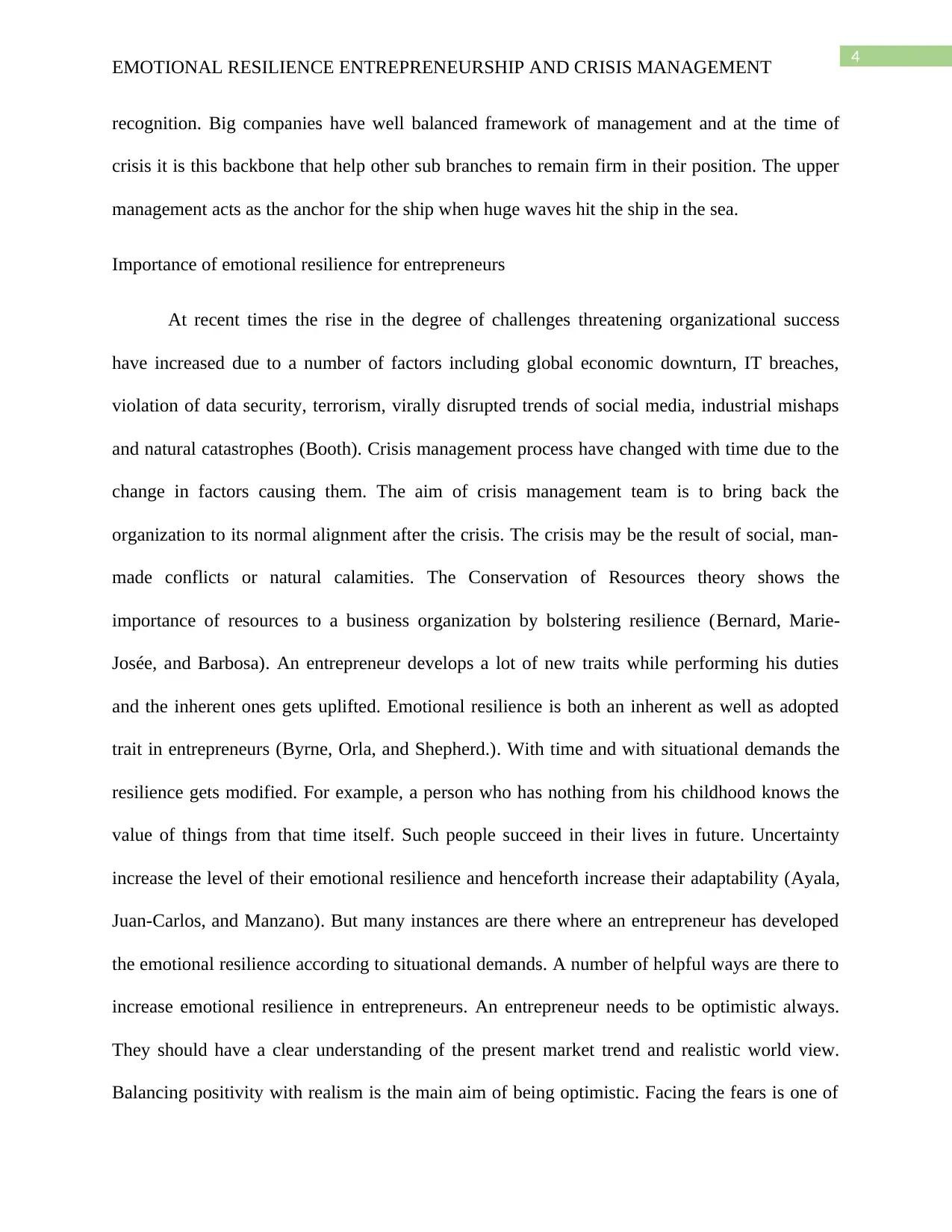
4
EMOTIONAL RESILIENCE ENTREPRENEURSHIP AND CRISIS MANAGEMENT
recognition. Big companies have well balanced framework of management and at the time of
crisis it is this backbone that help other sub branches to remain firm in their position. The upper
management acts as the anchor for the ship when huge waves hit the ship in the sea.
Importance of emotional resilience for entrepreneurs
At recent times the rise in the degree of challenges threatening organizational success
have increased due to a number of factors including global economic downturn, IT breaches,
violation of data security, terrorism, virally disrupted trends of social media, industrial mishaps
and natural catastrophes (Booth). Crisis management process have changed with time due to the
change in factors causing them. The aim of crisis management team is to bring back the
organization to its normal alignment after the crisis. The crisis may be the result of social, man-
made conflicts or natural calamities. The Conservation of Resources theory shows the
importance of resources to a business organization by bolstering resilience (Bernard, Marie-
Josée, and Barbosa). An entrepreneur develops a lot of new traits while performing his duties
and the inherent ones gets uplifted. Emotional resilience is both an inherent as well as adopted
trait in entrepreneurs (Byrne, Orla, and Shepherd.). With time and with situational demands the
resilience gets modified. For example, a person who has nothing from his childhood knows the
value of things from that time itself. Such people succeed in their lives in future. Uncertainty
increase the level of their emotional resilience and henceforth increase their adaptability (Ayala,
Juan-Carlos, and Manzano). But many instances are there where an entrepreneur has developed
the emotional resilience according to situational demands. A number of helpful ways are there to
increase emotional resilience in entrepreneurs. An entrepreneur needs to be optimistic always.
They should have a clear understanding of the present market trend and realistic world view.
Balancing positivity with realism is the main aim of being optimistic. Facing the fears is one of
EMOTIONAL RESILIENCE ENTREPRENEURSHIP AND CRISIS MANAGEMENT
recognition. Big companies have well balanced framework of management and at the time of
crisis it is this backbone that help other sub branches to remain firm in their position. The upper
management acts as the anchor for the ship when huge waves hit the ship in the sea.
Importance of emotional resilience for entrepreneurs
At recent times the rise in the degree of challenges threatening organizational success
have increased due to a number of factors including global economic downturn, IT breaches,
violation of data security, terrorism, virally disrupted trends of social media, industrial mishaps
and natural catastrophes (Booth). Crisis management process have changed with time due to the
change in factors causing them. The aim of crisis management team is to bring back the
organization to its normal alignment after the crisis. The crisis may be the result of social, man-
made conflicts or natural calamities. The Conservation of Resources theory shows the
importance of resources to a business organization by bolstering resilience (Bernard, Marie-
Josée, and Barbosa). An entrepreneur develops a lot of new traits while performing his duties
and the inherent ones gets uplifted. Emotional resilience is both an inherent as well as adopted
trait in entrepreneurs (Byrne, Orla, and Shepherd.). With time and with situational demands the
resilience gets modified. For example, a person who has nothing from his childhood knows the
value of things from that time itself. Such people succeed in their lives in future. Uncertainty
increase the level of their emotional resilience and henceforth increase their adaptability (Ayala,
Juan-Carlos, and Manzano). But many instances are there where an entrepreneur has developed
the emotional resilience according to situational demands. A number of helpful ways are there to
increase emotional resilience in entrepreneurs. An entrepreneur needs to be optimistic always.
They should have a clear understanding of the present market trend and realistic world view.
Balancing positivity with realism is the main aim of being optimistic. Facing the fears is one of
Paraphrase This Document
Need a fresh take? Get an instant paraphrase of this document with our AI Paraphraser
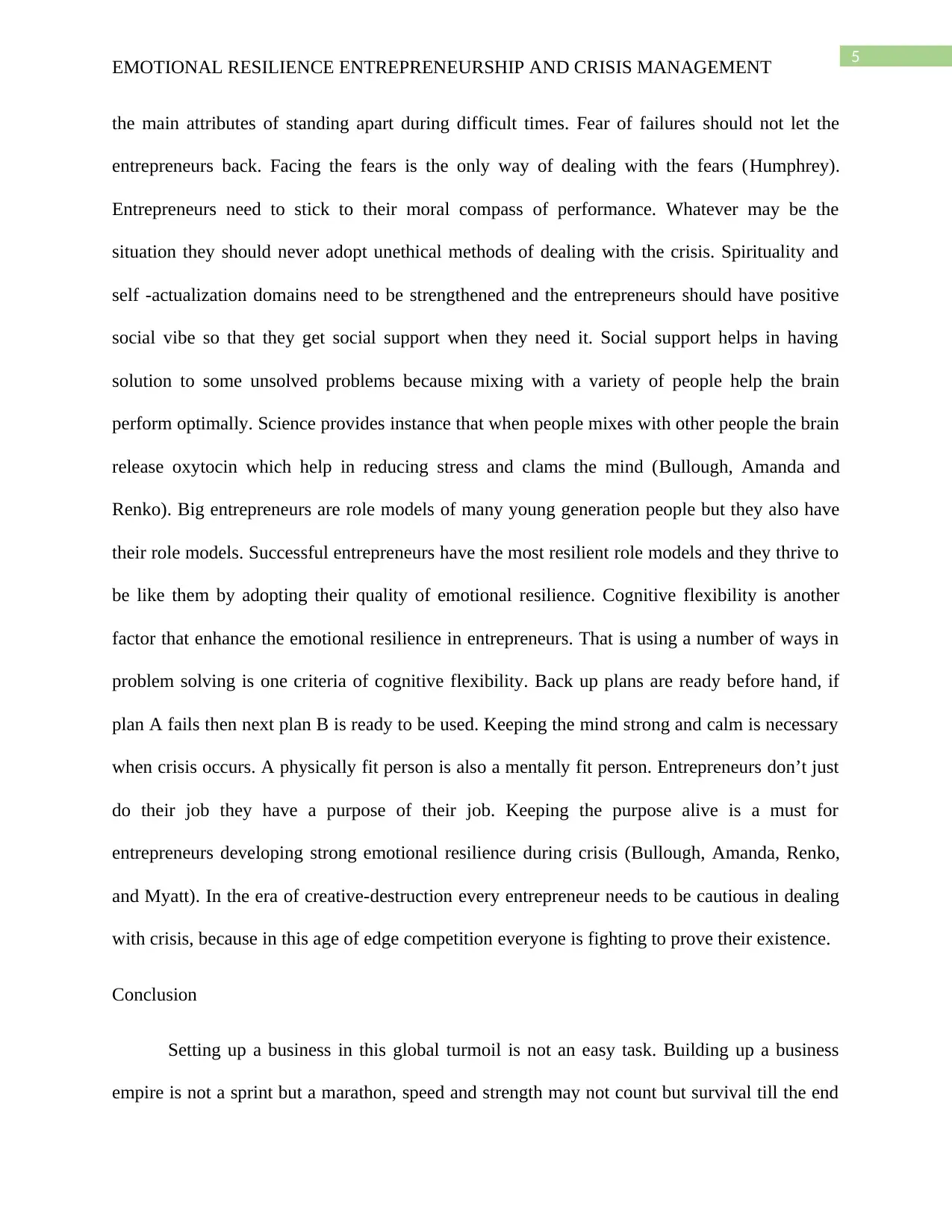
5
EMOTIONAL RESILIENCE ENTREPRENEURSHIP AND CRISIS MANAGEMENT
the main attributes of standing apart during difficult times. Fear of failures should not let the
entrepreneurs back. Facing the fears is the only way of dealing with the fears (Humphrey).
Entrepreneurs need to stick to their moral compass of performance. Whatever may be the
situation they should never adopt unethical methods of dealing with the crisis. Spirituality and
self -actualization domains need to be strengthened and the entrepreneurs should have positive
social vibe so that they get social support when they need it. Social support helps in having
solution to some unsolved problems because mixing with a variety of people help the brain
perform optimally. Science provides instance that when people mixes with other people the brain
release oxytocin which help in reducing stress and clams the mind (Bullough, Amanda and
Renko). Big entrepreneurs are role models of many young generation people but they also have
their role models. Successful entrepreneurs have the most resilient role models and they thrive to
be like them by adopting their quality of emotional resilience. Cognitive flexibility is another
factor that enhance the emotional resilience in entrepreneurs. That is using a number of ways in
problem solving is one criteria of cognitive flexibility. Back up plans are ready before hand, if
plan A fails then next plan B is ready to be used. Keeping the mind strong and calm is necessary
when crisis occurs. A physically fit person is also a mentally fit person. Entrepreneurs don’t just
do their job they have a purpose of their job. Keeping the purpose alive is a must for
entrepreneurs developing strong emotional resilience during crisis (Bullough, Amanda, Renko,
and Myatt). In the era of creative-destruction every entrepreneur needs to be cautious in dealing
with crisis, because in this age of edge competition everyone is fighting to prove their existence.
Conclusion
Setting up a business in this global turmoil is not an easy task. Building up a business
empire is not a sprint but a marathon, speed and strength may not count but survival till the end
EMOTIONAL RESILIENCE ENTREPRENEURSHIP AND CRISIS MANAGEMENT
the main attributes of standing apart during difficult times. Fear of failures should not let the
entrepreneurs back. Facing the fears is the only way of dealing with the fears (Humphrey).
Entrepreneurs need to stick to their moral compass of performance. Whatever may be the
situation they should never adopt unethical methods of dealing with the crisis. Spirituality and
self -actualization domains need to be strengthened and the entrepreneurs should have positive
social vibe so that they get social support when they need it. Social support helps in having
solution to some unsolved problems because mixing with a variety of people help the brain
perform optimally. Science provides instance that when people mixes with other people the brain
release oxytocin which help in reducing stress and clams the mind (Bullough, Amanda and
Renko). Big entrepreneurs are role models of many young generation people but they also have
their role models. Successful entrepreneurs have the most resilient role models and they thrive to
be like them by adopting their quality of emotional resilience. Cognitive flexibility is another
factor that enhance the emotional resilience in entrepreneurs. That is using a number of ways in
problem solving is one criteria of cognitive flexibility. Back up plans are ready before hand, if
plan A fails then next plan B is ready to be used. Keeping the mind strong and calm is necessary
when crisis occurs. A physically fit person is also a mentally fit person. Entrepreneurs don’t just
do their job they have a purpose of their job. Keeping the purpose alive is a must for
entrepreneurs developing strong emotional resilience during crisis (Bullough, Amanda, Renko,
and Myatt). In the era of creative-destruction every entrepreneur needs to be cautious in dealing
with crisis, because in this age of edge competition everyone is fighting to prove their existence.
Conclusion
Setting up a business in this global turmoil is not an easy task. Building up a business
empire is not a sprint but a marathon, speed and strength may not count but survival till the end
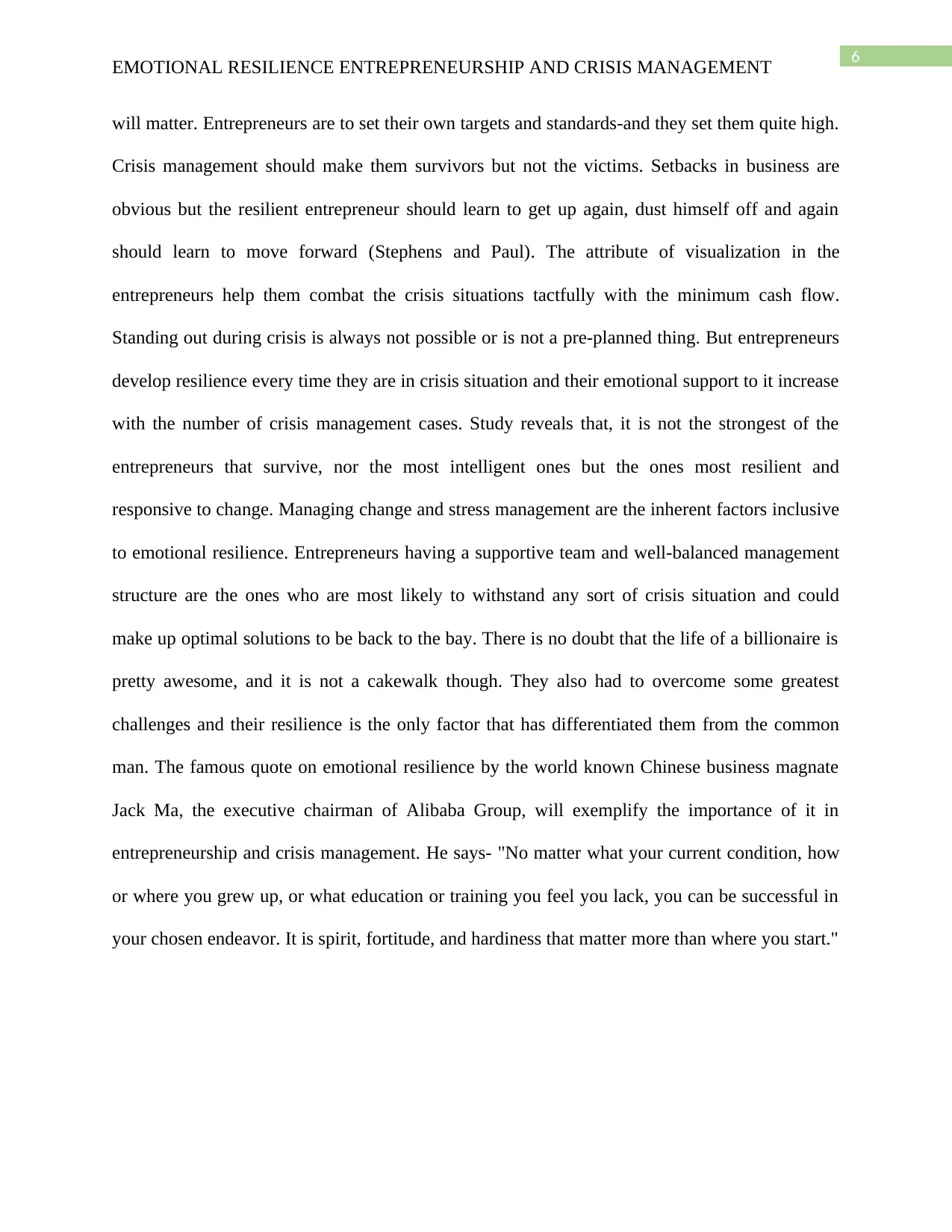
6
EMOTIONAL RESILIENCE ENTREPRENEURSHIP AND CRISIS MANAGEMENT
will matter. Entrepreneurs are to set their own targets and standards-and they set them quite high.
Crisis management should make them survivors but not the victims. Setbacks in business are
obvious but the resilient entrepreneur should learn to get up again, dust himself off and again
should learn to move forward (Stephens and Paul). The attribute of visualization in the
entrepreneurs help them combat the crisis situations tactfully with the minimum cash flow.
Standing out during crisis is always not possible or is not a pre-planned thing. But entrepreneurs
develop resilience every time they are in crisis situation and their emotional support to it increase
with the number of crisis management cases. Study reveals that, it is not the strongest of the
entrepreneurs that survive, nor the most intelligent ones but the ones most resilient and
responsive to change. Managing change and stress management are the inherent factors inclusive
to emotional resilience. Entrepreneurs having a supportive team and well-balanced management
structure are the ones who are most likely to withstand any sort of crisis situation and could
make up optimal solutions to be back to the bay. There is no doubt that the life of a billionaire is
pretty awesome, and it is not a cakewalk though. They also had to overcome some greatest
challenges and their resilience is the only factor that has differentiated them from the common
man. The famous quote on emotional resilience by the world known Chinese business magnate
Jack Ma, the executive chairman of Alibaba Group, will exemplify the importance of it in
entrepreneurship and crisis management. He says- "No matter what your current condition, how
or where you grew up, or what education or training you feel you lack, you can be successful in
your chosen endeavor. It is spirit, fortitude, and hardiness that matter more than where you start."
EMOTIONAL RESILIENCE ENTREPRENEURSHIP AND CRISIS MANAGEMENT
will matter. Entrepreneurs are to set their own targets and standards-and they set them quite high.
Crisis management should make them survivors but not the victims. Setbacks in business are
obvious but the resilient entrepreneur should learn to get up again, dust himself off and again
should learn to move forward (Stephens and Paul). The attribute of visualization in the
entrepreneurs help them combat the crisis situations tactfully with the minimum cash flow.
Standing out during crisis is always not possible or is not a pre-planned thing. But entrepreneurs
develop resilience every time they are in crisis situation and their emotional support to it increase
with the number of crisis management cases. Study reveals that, it is not the strongest of the
entrepreneurs that survive, nor the most intelligent ones but the ones most resilient and
responsive to change. Managing change and stress management are the inherent factors inclusive
to emotional resilience. Entrepreneurs having a supportive team and well-balanced management
structure are the ones who are most likely to withstand any sort of crisis situation and could
make up optimal solutions to be back to the bay. There is no doubt that the life of a billionaire is
pretty awesome, and it is not a cakewalk though. They also had to overcome some greatest
challenges and their resilience is the only factor that has differentiated them from the common
man. The famous quote on emotional resilience by the world known Chinese business magnate
Jack Ma, the executive chairman of Alibaba Group, will exemplify the importance of it in
entrepreneurship and crisis management. He says- "No matter what your current condition, how
or where you grew up, or what education or training you feel you lack, you can be successful in
your chosen endeavor. It is spirit, fortitude, and hardiness that matter more than where you start."
⊘ This is a preview!⊘
Do you want full access?
Subscribe today to unlock all pages.

Trusted by 1+ million students worldwide
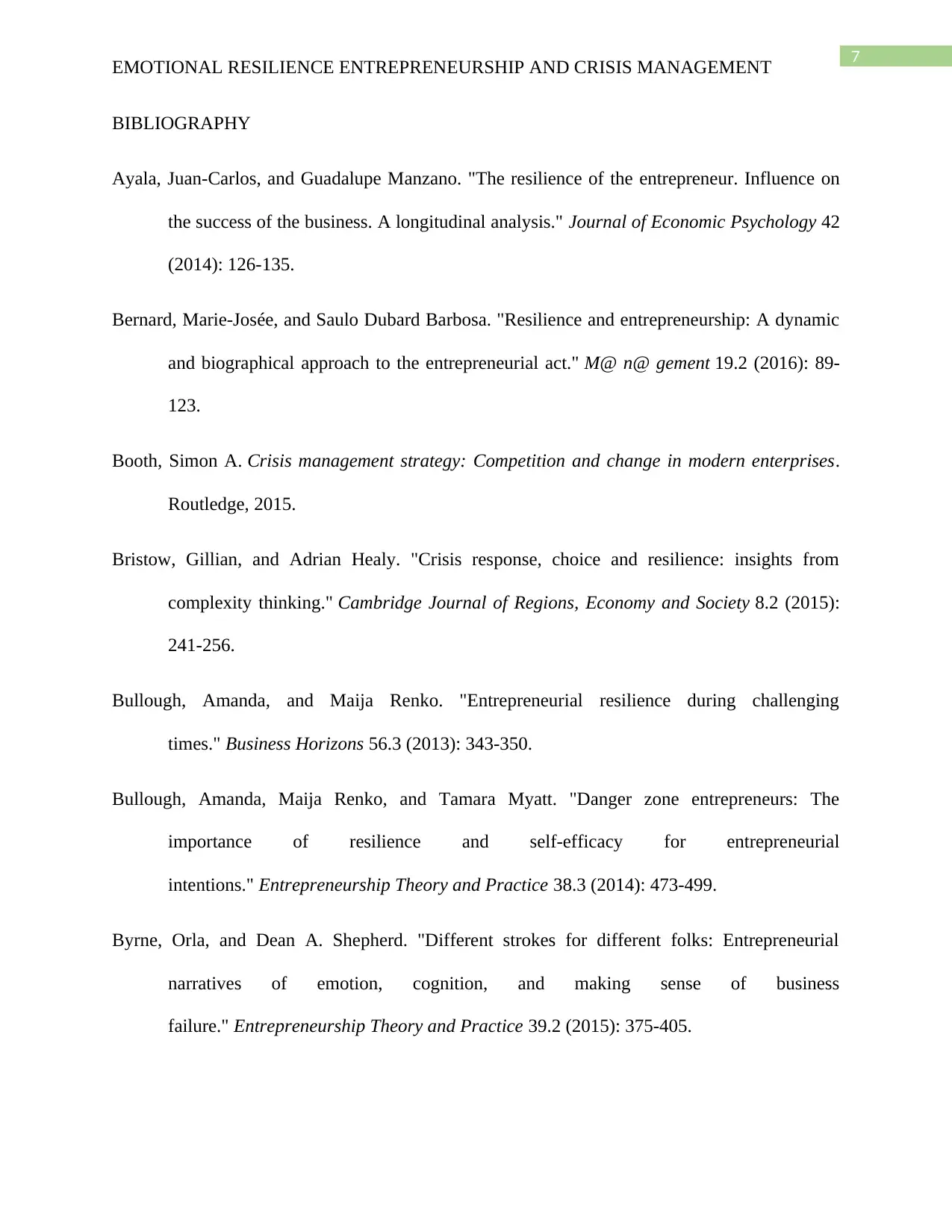
7
EMOTIONAL RESILIENCE ENTREPRENEURSHIP AND CRISIS MANAGEMENT
BIBLIOGRAPHY
Ayala, Juan-Carlos, and Guadalupe Manzano. "The resilience of the entrepreneur. Influence on
the success of the business. A longitudinal analysis." Journal of Economic Psychology 42
(2014): 126-135.
Bernard, Marie-Josée, and Saulo Dubard Barbosa. "Resilience and entrepreneurship: A dynamic
and biographical approach to the entrepreneurial act." M@ n@ gement 19.2 (2016): 89-
123.
Booth, Simon A. Crisis management strategy: Competition and change in modern enterprises.
Routledge, 2015.
Bristow, Gillian, and Adrian Healy. "Crisis response, choice and resilience: insights from
complexity thinking." Cambridge Journal of Regions, Economy and Society 8.2 (2015):
241-256.
Bullough, Amanda, and Maija Renko. "Entrepreneurial resilience during challenging
times." Business Horizons 56.3 (2013): 343-350.
Bullough, Amanda, Maija Renko, and Tamara Myatt. "Danger zone entrepreneurs: The
importance of resilience and self‐efficacy for entrepreneurial
intentions." Entrepreneurship Theory and Practice 38.3 (2014): 473-499.
Byrne, Orla, and Dean A. Shepherd. "Different strokes for different folks: Entrepreneurial
narratives of emotion, cognition, and making sense of business
failure." Entrepreneurship Theory and Practice 39.2 (2015): 375-405.
EMOTIONAL RESILIENCE ENTREPRENEURSHIP AND CRISIS MANAGEMENT
BIBLIOGRAPHY
Ayala, Juan-Carlos, and Guadalupe Manzano. "The resilience of the entrepreneur. Influence on
the success of the business. A longitudinal analysis." Journal of Economic Psychology 42
(2014): 126-135.
Bernard, Marie-Josée, and Saulo Dubard Barbosa. "Resilience and entrepreneurship: A dynamic
and biographical approach to the entrepreneurial act." M@ n@ gement 19.2 (2016): 89-
123.
Booth, Simon A. Crisis management strategy: Competition and change in modern enterprises.
Routledge, 2015.
Bristow, Gillian, and Adrian Healy. "Crisis response, choice and resilience: insights from
complexity thinking." Cambridge Journal of Regions, Economy and Society 8.2 (2015):
241-256.
Bullough, Amanda, and Maija Renko. "Entrepreneurial resilience during challenging
times." Business Horizons 56.3 (2013): 343-350.
Bullough, Amanda, Maija Renko, and Tamara Myatt. "Danger zone entrepreneurs: The
importance of resilience and self‐efficacy for entrepreneurial
intentions." Entrepreneurship Theory and Practice 38.3 (2014): 473-499.
Byrne, Orla, and Dean A. Shepherd. "Different strokes for different folks: Entrepreneurial
narratives of emotion, cognition, and making sense of business
failure." Entrepreneurship Theory and Practice 39.2 (2015): 375-405.
Paraphrase This Document
Need a fresh take? Get an instant paraphrase of this document with our AI Paraphraser
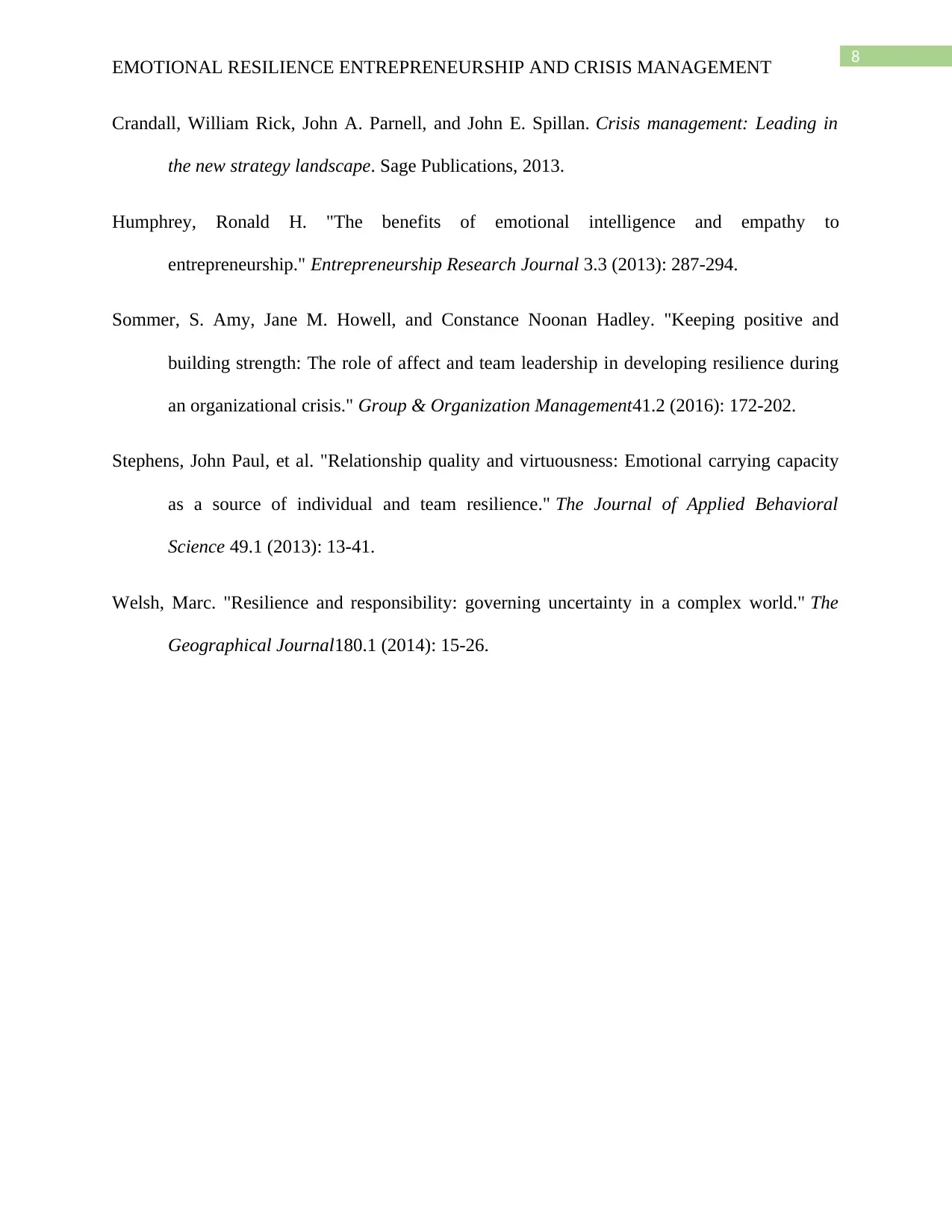
8
EMOTIONAL RESILIENCE ENTREPRENEURSHIP AND CRISIS MANAGEMENT
Crandall, William Rick, John A. Parnell, and John E. Spillan. Crisis management: Leading in
the new strategy landscape. Sage Publications, 2013.
Humphrey, Ronald H. "The benefits of emotional intelligence and empathy to
entrepreneurship." Entrepreneurship Research Journal 3.3 (2013): 287-294.
Sommer, S. Amy, Jane M. Howell, and Constance Noonan Hadley. "Keeping positive and
building strength: The role of affect and team leadership in developing resilience during
an organizational crisis." Group & Organization Management41.2 (2016): 172-202.
Stephens, John Paul, et al. "Relationship quality and virtuousness: Emotional carrying capacity
as a source of individual and team resilience." The Journal of Applied Behavioral
Science 49.1 (2013): 13-41.
Welsh, Marc. "Resilience and responsibility: governing uncertainty in a complex world." The
Geographical Journal180.1 (2014): 15-26.
EMOTIONAL RESILIENCE ENTREPRENEURSHIP AND CRISIS MANAGEMENT
Crandall, William Rick, John A. Parnell, and John E. Spillan. Crisis management: Leading in
the new strategy landscape. Sage Publications, 2013.
Humphrey, Ronald H. "The benefits of emotional intelligence and empathy to
entrepreneurship." Entrepreneurship Research Journal 3.3 (2013): 287-294.
Sommer, S. Amy, Jane M. Howell, and Constance Noonan Hadley. "Keeping positive and
building strength: The role of affect and team leadership in developing resilience during
an organizational crisis." Group & Organization Management41.2 (2016): 172-202.
Stephens, John Paul, et al. "Relationship quality and virtuousness: Emotional carrying capacity
as a source of individual and team resilience." The Journal of Applied Behavioral
Science 49.1 (2013): 13-41.
Welsh, Marc. "Resilience and responsibility: governing uncertainty in a complex world." The
Geographical Journal180.1 (2014): 15-26.
1 out of 8
Related Documents
Your All-in-One AI-Powered Toolkit for Academic Success.
+13062052269
info@desklib.com
Available 24*7 on WhatsApp / Email
![[object Object]](/_next/static/media/star-bottom.7253800d.svg)
Unlock your academic potential
Copyright © 2020–2026 A2Z Services. All Rights Reserved. Developed and managed by ZUCOL.





